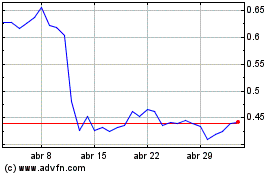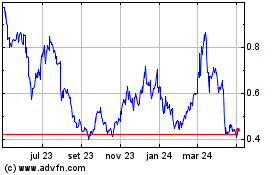Founder of Curve Finance faces liquidation after CRV token drop
Michael Egorov, the founder of Curve Finance (COIN:CRVUSD),
faced liquidation after the CRV token hit an all-time low of $0.22.
Approximately 100 million CRV were liquidated, totaling $27
million, but Egorov still holds 39.35 million CRV securely. This
situation triggered widespread liquidations, causing concern among
investors. Despite this, Curve Finance praised its soft liquidation
mechanism during the recent market turmoil, highlighting its
resilience against adverse events like the UwU hack.
Gary Gensler predicts approval of Ether ETFs by the end of Q3
Cryptocurrency markets faced continued pressure during
Thursday’s US trading session, following a drop initiated after the
Fed indicated a single rate cut this year. During a hearing before
the US Senate Appropriations Committee, SEC Chairman Gary Gensler
indicated that Ether exchange-traded funds (ETFs) could be approved
by the end of the third quarter. He mentioned that issuers are
progressing with the registration process and approval to list
these ETFs could happen in the coming months. These ETFs would
allow investors to trade Ether without directly holding the
cryptocurrency. Despite a brief recovery spurred by Gensler’s
optimistic comments, Ethereum (COIN:ETHUSD) fell by -2.7% to
$3,463. Bitcoin (COIN:BTCUSD) also dropped by 2.3%, trading near
$66,703.
Bitcoin ETFs see $100.8 million inflow after previous outflows
On June 12, Bitcoin ETFs experienced a positive turnaround, with
an inflow of $100.8 million after two consecutive days of outflows.
Notably, Fidelity’s ETF (AMEX:FBTC) led with $50.6 million in
inflows, followed by BlackRock’s ETF (NASDAQ:IBIT) with $15.6
million and Bitwise’s ETF (AMEX:BITB) with $14.5 million. This
shift was driven by the recent increase in Bitcoin’s price and
favorable US economic data.
SEC may receive little from multibillion-dollar settlement with
Terraform Labs
Chris Amani, CEO of Terraform Labs, announced the company’s
closure following a $4.47 billion settlement with the US SEC. The
plan includes selling projects and transferring control to the
community. This decision follows the collapse of the UST stablecoin
in 2022. The community reacted mixedly, and Terra (COIN:LUNAUSD)
and Terra Luna Classic (COIN:LUNCUSD) prices fell after the
announcement, underscoring the importance of regulatory compliance
and governance in the crypto space. The SEC is likely to receive a
fraction of the amount due to the company’s bankruptcy process,
which shows $430.1 million in assets against $450.9 million in
liabilities. Bankruptcy payment priorities place government fines
and penalties, like those from the SEC, behind secured
creditors.
Growth and rotation in the digital asset market in 2024
So far, the digital asset sector has accumulated $12 billion in
net inflows in 2024, with projections from JPMorgan Chase
(NYSE:JPM) indicating this could reach $26 billion by year-end. The
report highlights that spot bitcoin ETFs are the main contributors,
attracting $16 billion of these inflows. However, a significant
portion of these inflows appears to be a reallocation of funds from
digital wallets on exchanges to the new ETFs, rather than new
capital entering the crypto market.
MicroStrategy seeks $500 million to buy more Bitcoin
MicroStrategy (NASDAQ:MSTR) plans to issue $500 million in
senior convertible notes to finance new Bitcoin (COIN:BTCUSD)
acquisitions. Targeted at qualified institutional buyers, the
private offering aims to bolster the company’s position in a
volatile market. With 214,400 BTC currently in its portfolio,
valued at around $15 billion, MicroStrategy will offer the option
to purchase up to an additional $75 million in notes. The notes
will mature in 2032, and investors can convert them into cash,
MicroStrategy common stock, or a combination of both, aligning with
Michael Saylor’s Bitcoin-focused growth strategy.
P2P.org launches crypto staking services for institutional clients
in collaboration with OKX
P2P.org, specializing in institutional validation, has
introduced cryptocurrency staking services for large clients in
partnership with the OKX exchange. This service is part of the
staking-as-a-business (SaaB) model, allowing enterprise clients to
use staking on a range of crypto assets like Polkadot, Kusama,
Celestia, and Cardano. This collaboration with OKX facilitates
yield generation without the complexities of setting up new nodes.
Notably, technical difficulties and operational costs have been
significant barriers for institutions entering this sector. P2P.org
has also achieved a total value locked of $7.5 billion and
presented its staking business model to reduce these obstacles for
institutions.
Privado ID rebrands and separates from Polygon Labs to expand in
digital identity market
Privado ID, formerly known as Polygon ID, has separated from
Polygon Labs (COIN:MATICUSD) to operate independently in the
growing digital identity market. According to the company, this
change aims to meet the rising demand for digital identity
solutions, both online and on-chain, forecasting the market to grow
to $101.37 billion by 2030. Privado ID plans to offer its solutions
across various Ethereum Virtual Machine (EVM)-compatible
blockchains, expanding its reach beyond the Polygon network.
Film.io and VillageDAO drive decentralization in the film industry
Film.io, led by Bryan Hertz, is the first official partner of
VillageDAO, a smart contract framework within ConsenSys. Film.io
uses blockchain to democratize the Hollywood studio system,
allowing filmmakers to create and fund independent projects. The
partnership aims to provide a better-managed environment than
traditional platforms like Discord, promoting advanced technology,
efficient funding, and robust community support. The certified
“Community Expert” program will help integrate new members and
strengthen the Film.io community within VillageDAO.
Exploring the potential of blockchains to fund public good
While many see crypto as merely a wealth opportunity, the
technology is also driving innovations in public financing. At a
Consensus 2024 talk, an industry expert highlighted how blockchains
are creating scalable and transparent ways to fund social and
environmental projects. Although still in its infancy, these
mechanisms promise to transform resource distribution globally,
challenging traditional economic and governance paradigms.
European Commission selects Iota for Web3 identification solution
The European Commission has chosen Iota’s (COIN:IOTAUSD) Web3
identification solution for its European Blockchain Sandbox (EBSI)
initiative. The project aims to revamp traditional KYC through DLT
and tokenization. Iota plans to use its participation to explore
privacy and KYC regulations in the Web3 environment, crucial for
the evolution of decentralized finance (DeFi). The EBSI provides a
controlled environment for blockchain technology testing, focusing
on facilitating interaction between projects and EU regulators.
BNB Chain launches incubation alliance for Web3 projects
BNB Chain (COIN:BNBUSD) has unveiled a new initiative in
collaboration with Binance Labs: the BNB Incubation Alliance (BIA),
aimed at supporting early-stage blockchain projects. The program
offers a 10-week accelerator, grants, investments, and launch
services for builders and developers. Participant selection will
occur through global events, focusing on early-stage blockchain
ventures. The first edition of the BIA will launch during the
Ethereum Community Conference in Brussels.
Joe Biden plans crypto donations despite proposed high taxes for
mining
Joe Biden’s campaign team is exploring the possibility of
accepting crypto donations via Coinbase Commerce, aiming to attract
support from the crypto community. This initiative comes after a
period of strained regulatory relations between the Biden
administration and the crypto sector. Additionally, the Biden
administration’s recent proposal suggests a new 30% tax
specifically for cryptocurrency miners, part of the next fiscal
year’s budget. This initiative contrasts with former President
Trump’s pro-crypto policies, which recently encouraged US dominance
in bitcoin mining. The measure aims to address environmental
concerns and regulate the industry, but critics argue it would
stifle sector growth, discourage innovation, and could be
unconstitutional due to its focus on a single industry.
Tether CEO claims Bitcoin is the only decentralized asset
The CEO of Tether (COIN:USDTUSD), Paolo Ardoino, emphasized
Bitcoin’s uniqueness in terms of decentralization. While most
cryptocurrencies rely on developer groups for updates and monetary
policy changes, Bitcoin is governed solely by mathematical
algorithms. Its limited and predictable supply, with halvings every
four years, provides certainty to investors. Ardoino acknowledged
that his view might be controversial, especially regarding Tether’s
centralization. He also expressed skepticism about memecoins and
participated in BTC Prague, an event focused exclusively on
Bitcoin.
Paxos cuts staff to focus on tokenization and stablecoins
Paxos (COIN:PAXGUST) laid off 65 employees, about 20% of its
workforce, to concentrate on tokenization and stablecoins. CEO
Charles Cascarilla stated that the layoffs would strengthen the
company’s ability to capitalize on opportunities in these sectors.
Despite previous regulatory challenges, including restrictions on
Binance’s BUSD, Paxos maintains a robust financial position with
over $500 million in corporate assets. The company plans to
gradually wind down settlement services to focus exclusively on
developing tokenization and stablecoin solutions.
Swiss digital bank focused on crypto declares bankruptcy
FlowBank, a Swiss digital bank focused on cryptocurrencies, has
been declared bankrupt and closed by the Swiss Financial Market
Supervisory Authority (FINMA) due to capital insufficiency and
severe violations of minimum requirements. The institution, which
began operations in 2020 and offered crypto-related services, now
faces liquidation with no prospects of restructuring, while
customers with guaranteed deposits await fund returns.
Manta Network establishes $50 million fund for development
ecosystem
Manta Network launched a $50 million fund to boost projects on
its modular layer 2 network, focusing on zero-knowledge
applications. This funding will be distributed over a year through
direct investments, grants, and support for hackathons. Despite a
decline in total value locked following a crypto yield program,
Manta remains resilient after a previous DDoS attack. The fund aims
to catalyze innovation and sustainable growth within the Manta
ecosystem.
Nuffle Labs receives $13 million to develop NEAR data layer
The NEAR Foundation launched Nuffle Labs, an independent entity,
securing $13 million in strategic funding. Nuffle Labs will focus
on developing the NEAR Data Availability Layer (NEAR DA) and other
modular NEAR products. Funding came from the NEAR Foundation,
Electric Capital, and other investors. The company aims to enhance
the competitiveness of NEAR products and leverage the strengths of
various platforms to strengthen the ecosystem. The NEAR token
(COIN:NEARUSD) is currently priced at $6.08.
Curve DAO Token (COIN:CRVUSD)
Gráfico Histórico do Ativo
De Dez 2024 até Jan 2025

Curve DAO Token (COIN:CRVUSD)
Gráfico Histórico do Ativo
De Jan 2024 até Jan 2025
